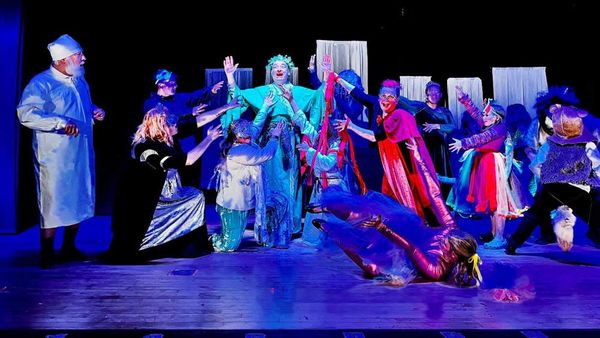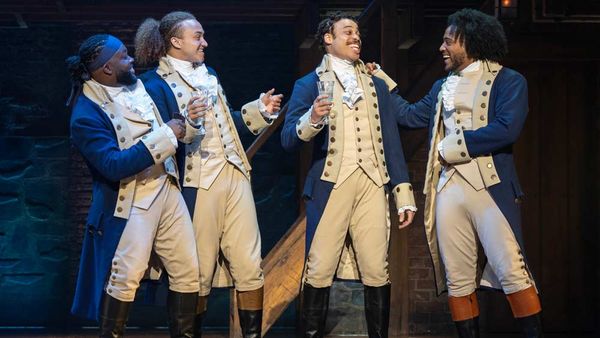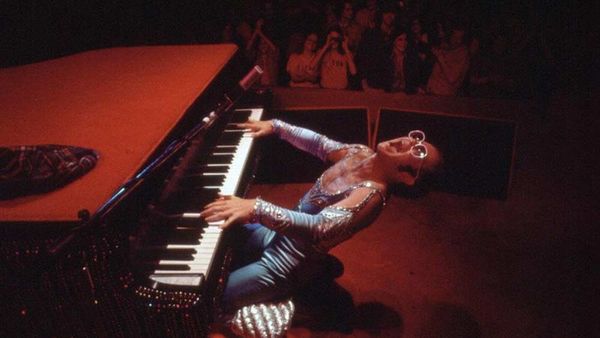
March 4, 2018
The Hotel Nepenthe
Kilian Melloy READ TIME: 5 MIN.
If only Ryan Murphy had used John Kuntz's "Hotel Nepenthe" as the basis for that hotel-centric season of "American Horror Story." But then again, who knows? In some parallel reality, he might have.
Kuntz's play premiered at Boston Playwrights' Theater in 2012, indicating its high-flown notions of diverging realities by using a set dominated by television screens. In the Brown Box Theatre Project's iteration, television is still a defining metaphor -- as well it might be, since one of the few recurring characters in the piece is, possibly, a living version of Tabitha from the classic '60s sitcom "Bewitched" -- but so is radio. (The play is stuffed with popular songs that drift in and out and fade into each other as though the radio dial were perpetually wandering from frequency to frequency.) Either metaphor will do; this is a work of theater that plays with the notion that, in its highest form, reality is an endless stream of possibilities that fork, re-fork, resonate, and perhaps even recombine.
At the heart of all these swirling possibilities is the Hotel Nepenthe, a crux for the inter-dimensional fun. It's here that a hotel guest is murdered in spectacularly bloody fashion, and a politician falls victim to an unhappy wife's scheme; where an actress bores her horny young hookup with meandering tales of her celebrity-stuffed itinerary (or maybe she's describing a dream); and where a bellhop discovers a forgotten hatbox before engaging in a kaleidoscopic, ever-shifting encounter with a guest and his female companion.
The city streets around the hotel are equally given to a tumult of transformations. A baby is killed, or maybe snatched; the purple-haired perpetrator of the crime rushes into the night toward a mysterious destiny -- or else she's forced to pause, her flight arrested by a lack of available cabs, only to abandon the infant with a harried dispatcher; one of the dispatcher's drivers has gone radio silent, thanks to the fact that a psychotic passenger has overpowered him and locked him in the trunk of his own taxi; a passenger desperate to reach the hotel and rescue his distraught boyfriend takes a surreal cruise with the psycho, who has decided to pirate the cab; the boyfriend in question has an amusing conversation with the tired, crabby driver of an otherwise-empty bus.
Still more fantastical apparitions flutter in the penumbra of multiplying realities. A fairy godfather complete with tutu and wings pays a visit to an anxious mother; a pair of spectral entities with magic wands playfully re-set mundane situations in order to demonstrate how the most casual of everyday interactions are fraught with endless possible outcomes. If you start to feel like someone might have slipped a hallucinogen into your coffee, don't worry: That's just Kuntz's imagination having its way with you.
The four-person cast have a marvelous time creating these many worlds right before your eyes. Margaret Clark, Rebecca Schneebaum, Cam Torres, and Michael Underhill sculpt an array of distinct characters, moods, and tones. Are they supposed to be representing the same people in different versions of the universe? Are they different people in the same universe? Yes, and yes, and also D., none of the above. The cast bring a prankster's sense of joy at the sheer chaos of it all, but still manages to follow the play's occasional cross-cutting, dimension-piercing storytelling thread.
There are no banks of TV screens in the Brown Box production, but scenic designer Abby Schenker has an idea that kills numerous birds with one stone. She's come up with wooden frames sized to look like they could fit into one another, suggesting the nesting structure of these frenzied realities. Those set pieces also serve as the settings for various scenes; Underhill and Clark lounge atop one structure, which fills in for their room at the Hotel Nepenthe. Torres, too, perches on one frame as the dispatcher, seated behind a desk and -- we suppose -- given a godlike perspective via his radio, able to track his cabs throughout the city without needing to move. Clark leads against a smaller frame, which stands in as the desk at a car rental agency. The cast wheels these large heavy structures around, re-forming the performance environment as fluidly and constantly as the narrative shifts its shape. You can't sculpt water, but director Alex Lonati makes sure you grasp the nature and contours of each distinct scene, and a collage effect takes hold with stories within stories all adding up to something larger -- something formless and eternal, but still suggestive of tantalizing potential truths.
Funny, challenging, ceaselessly fascinating, this hotel is a place to check in if you want to get your mind blown, or blown up, or blown over the rainbow. This isn't a hotel, after all, but an full-on amusement park.
"The Hotel Nepenthe" continues at Atlantic Wharf Waterfront Plaza through March 11, then continues at other venues. For tickets and a full schedule, go to https://brownboxtheatre.org/portfolio-items/the-hotel-nepenthe/?portfolioCats=48
Kilian Melloy serves as EDGE Media Network's Associate Arts Editor and Staff Contributor. His professional memberships include the National Lesbian & Gay Journalists Association, the Boston Online Film Critics Association, The Gay and Lesbian Entertainment Critics Association, and the Boston Theater Critics Association's Elliot Norton Awards Committee.







